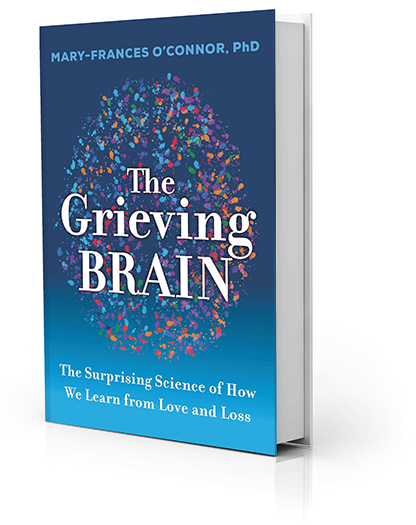Home > Resources > Mary-Frances O’Connor, PhD | The Grieving Brain: The Surprising Science of How We Learn From Love and Loss
The Grieving Brain: The Surprising Science of How We Learn From Love and Loss
by Mary-Frances O’Connor, PhD, reviewed by Lara Stewart-Panko
In this highly readable book, Mary Frances O’Connor shares what neuroscience has discovered about grief, including elegant explanations for many common symptoms. While acknowledging that additional perspectives on grieving, such as sociological and spiritual ones, are very important pieces of the picture, she does a beautiful job of articulating what the neurobiological lens can do in terms of increasing our understanding of the experience.
In addition to discussing science, theory, and care approaches, O’Connor weaves a story throughout the book, including her personal experiences of grieving. One powerful concept she shares is that of grief as a learning process; when a loved one dies, one must learn how to live in the world anew. O’Connor describes the brain as undergoing a “remapping” of sorts, explaining both how different brain structures and chemistry are involved, and how it all looks in people’s lived experiences. While the focus of the book is bereavement that occurs after the loss of a close person, there’s even a notable foray into parasocial grief that can be experienced when a celebrity dies.
A worthy portion of the book is dedicated to the psychological experience of grieving, including how mental health factors can influence trajectory. O’Connor chimes in on the Elisabeth Kübler-Ross approach to grief, and does justice to the dual process model posited by Margaret Stroebe and Henk Schut. She provides fascinating findings about grief-related rumination and panic that can arise as part of bereavement. As a psychotherapist, I especially appreciate how she articulates grieving as a spectrum, providing a helpful perspective on the relatively recent diagnostic category of prolonged grief disorder.
In offering a balanced examination of grief, O’Connor not only helps us understand the hard parts, but the enriching aspects as well. She wisely states: “There is grief in this world—not just yours in particular—and feeling grief at some point is one of the rules of being human.” By discussing resilience, acknowledging the possibility of post-traumatic growth, and recognizing those who are able to integrate their ongoing relationship with their beloved into a continuing, satisfying life, O’Connor gifts hope and compassion, allowing for all possibilities and providing supportive information to make each journey that much easier.

